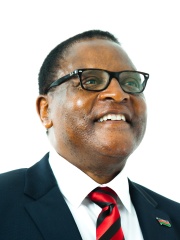
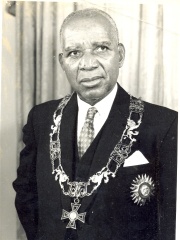
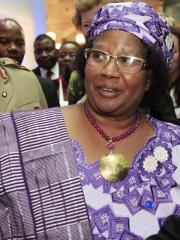
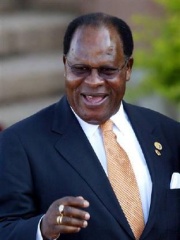
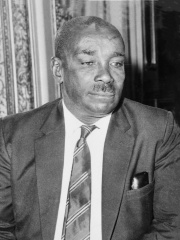
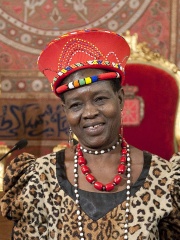
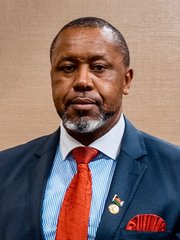
The Most Famous
POLITICIANS from Malawi
This page contains a list of the greatest Malawian Politicians. The pantheon dataset contains 19,576 Politicians, 7 of which were born in Malawi. This makes Malawi the birth place of the 172nd most number of Politicians behind Puerto Rico, and Cameroon.
Top 8
The following people are considered by Pantheon to be the most legendary Malawian Politicians of all time. This list of famous Malawian Politicians is sorted by HPI (Historical Popularity Index), a metric that aggregates information on a biography's online popularity.

1. Lazarus Chakwera (b. 1955)
With an HPI of 69.94, Lazarus Chakwera is the most famous Malawian Politician. His biography has been translated into 43 different languages on wikipedia.
Lazarus McCarthy Chakwera (born 5 April 1955) is a Malawian politician, theologian, and pastor who served as the sixth president of Malawi from 2020 to 2025. A member of the Malawi Congress Party (MCP), he has served as the party's president since 2013. He also served as President of the Malawian Assemblies of God from 1989 to 2013, and during his presidency concurrently served as Minister of Defense from 2020 to 2023. Born in Lilongwe, Chakwera graduated from the University of Malawi in 1977 with a bachelor's degree in arts and philosophy. He then joined the Malawian Assemblies of God's School of Theology in 1983 where he became its president in 1996 and served in this role until 2000. During this time, Chakwera became the president of the Malawian Assemblies of God in 1989 and served in this role until his resignation 2013, when he entered politics and joined the Malawi Congress Party and was elected as the party's leader in August of that year. In the presidential election held the following year, Chakwera ran for the presidency, but while getting more votes than incumbent Joyce Banda, he lost to the Democratic Progressive Party (DPP)'s presidential candidate Peter Mutharika. In the 2019 presidential election, Chakwera lost again to Mutharika. However, in February 2020, the Constitutional Court annulled the election results citing irregularities and a rerun election was held, where Chakwera won. During his presidency, Chakwera implemented governance and education reforms, improved international engagement, and made efforts to increase transparency. He builds more schools, especially in rural areas and also improved some infrastructure in the country. However, Chakwera's presidency was overshadowed by economic challenges such as high inflation, rising cost of living, currency devaluation, and growing public debt. Despite his anti-corruption stance, Chakwera also faced criticism over corruption and nepotism, which he promises to fight when coming to office. Chakwera appointed relatives to his cabinet and also appointed people related to some members of his cabinet. Several protests also occurred during Chakwera's presidency, in July and October 2022 and 2024, all of which were against Chakwera and his government's slow handling of corruption cases and as well as the cost of living. In some of these peaceful demonstrations, protesters were attacked by masked, machete-wielding men, an incident condemned by rights groups and foreign missions. As a result of the economic crisis and the slow handling of corruption cases and as well as nepotism, Chakwera lost the 2025 presidential election to Mutharika.

2. Hastings Banda (1898 - 1997)
With an HPI of 66.58, Hastings Banda is the 2nd most famous Malawian Politician. His biography has been translated into 67 different languages.
Hastings Kamuzu Banda (c. 1898 or 1906 – 25 November 1997) was a Malawian politician and statesman who served as the leader of Malawi from 1964 to 1994. He served as Prime Minister from independence in 1964 to 1966, when Malawi was a Dominion/Commonwealth realm. In 1966, the country became a republic and he became the first president as a result, ruling until his defeat in 1994. After receiving much of his education in ethnography, linguistics, history, and medicine overseas, Banda returned to Nyasaland to speak against colonialism and advocate for independence from the United Kingdom. He was formally appointed Prime Minister of Nyasaland and led the country to independence in 1964. Two years later, he proclaimed Malawi a republic with himself as the first president. He consolidated power and later declared Malawi a one-party state under the Malawi Congress Party (MCP). In 1970, the MCP made Banda the party's president for life. In 1971, he became president for life of Malawi itself. A renowned anti-communist leader in Africa, he received support from the Western Bloc during the Cold War. He generally supported women's rights, improved the country's infrastructure, and maintained a good educational system relative to other African countries. However, Banda presided over one of the most repressive regimes in Africa, an era that saw political opponents regularly tortured and murdered. Human rights groups estimate that at least 6,000 people were killed, tortured, and jailed without trial. As many as 18,000 people were killed during his rule, according to one estimate. His rule has been characterised as a "highly repressive autocracy". Banda also received criticism for maintaining full diplomatic relations with the apartheid government in South Africa. By 1993, amid increasing domestic and international pressure, he agreed to hold a referendum which ended the one-party system. Soon afterwards, a special assembly ended his life-term presidency and stripped him of most of his powers. Banda ran for president in the democratic elections that followed and was defeated. He died in South Africa in 1997.

3. Joyce Banda (b. 1950)
With an HPI of 62.51, Joyce Banda is the 3rd most famous Malawian Politician. Her biography has been translated into 63 different languages.
Joyce Hilda Banda (née Ntila; born 12 April 1950) is a Malawian politician, educator, and activist who served as the fourth president of Malawi from 2012 to 2014. She became president after the death of Bingu wa Mutharika, under whom has served as the fourth vice president from 2009 to 2012. A member of the People's Party, Banda has led the party since its creation in 2011, and was the first female president of Malawi and the second head of state, after Elizabeth II, and the second in Africa, after Liberia's Ellen Johnson Sirleaf. Born in Malemia, Banda graduated from the Columbus University and the Royal Roads University with a bachelor's degree and a master's degree in arts, and the Atlantic International University with a bachelor's degree on social science in the early 1970s. She then founded the Joyce Banda Foundation, the National Association of Business Women (NABW), Young Women Leaders Network, and the Hunger Project. Banda joined politics in 1999 and was elected to the National Assembly as a member of the United Democratic Front (UDF) the party of President Bakili Muluzi. In 2004, Banda was appointed Minister of Gender, Child Welfare, and Community Service by President Mutharika. During her time in the position, she enforced the 2006 Domestic Violence Bill, and also designed the National Platform for Action on Orphans and Vulnerable Children and the Zero Tolerance Campaign Against Child Abuse. Banda was later appointed Minister of Foreign Affairs where she switched Malawi's recognition from the Republic of China to the People's Republic of China in an attempt to bring economic growth to Malawi. In 2009, Mutharika ran for re-election and selected Banda as his running mate in the general election, with their ticket winning and she thus becoming the first vice president. Banda's term as vice president was marked by growing tensions between her and Mutharika as Banda refused to endorse Mutharika's brother, Peter, as his successor to the presidency. Banda was subsequently kicked out of the DPP and she founded the People's Party, but then remained vice president according to the Constitution. In April 2012, Mutharika died and while according to the Constitution Banda as vice president becomes president. However, some members of the DPP who were loyal to Mutharika tried installing his brother as president, triggering a succession crisis. Despite this, Banda as stated by the law, became president with the support of the military, who backed the Constitution. In 2014, Banda lost the general election to Peter Mutharika, brother of the late Bingu. While Banda at first refused to concede and demand a rerun citing fruad, Banda eventually conceded and handed over power to Mutharika on 31 May. In June 2014, Forbes named Banda as the 40th most powerful woman in the world and the most powerful woman in Africa. In October 2014, she was included in the BBC's 100 Women.

4. Bakili Muluzi (b. 1941)
With an HPI of 59.97, Bakili Muluzi is the 4th most famous Malawian Politician. His biography has been translated into 38 different languages.
Elson Bakili Muluzi (born 17 March 1943) is a Malawian politician who was President of Malawi from 1994 to 2004. He was also chairman of the United Democratic Front (UDF) until 2009. He succeeded Hastings Kamuzu Banda as Malawi's president. He also served in Banda's cabinet as minister without portfolio, before retiring in 1980. Muluzi served as minister and secretary general of Brown Matonyola for years until he was dismissed for abusing MCP party funds.
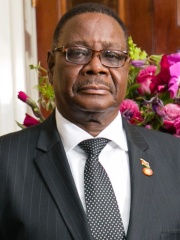
5. Peter Mutharika (b. 1940)
With an HPI of 59.56, Peter Mutharika is the 5th most famous Malawian Politician. His biography has been translated into 54 different languages.
Arthur Peter Mutharika ( moot-ə-REE-kə; born 18 July 1940) is a Malawian politician and lawyer who is the fifth and the seventh president of Malawi since independence. A member of the Democratic Progressive Party (DPP) and the younger brother of the third president, Bingu wa Mutharika, he served as the fifth president from 2014 to 2020, and has also been leading the DPP since 2012. Born in Thyolo District, Mutharika graduated from the University of London in 1965 with a bachelor's degree in law, and the Yale University with a master's degree in law in 1966 and a doctorate in Juridical Science in 1968. In 1971, he was admitted to the bar in Tanzania and became a professional lawyer. As professor, Mutharika taught several universities in the United States, the United Kingdom, Tanzania, Ethiopia, and Uganda. He has also worked in the field of international justice, specialising in international economic law, international law and comparative constitutional law. In 2009, Mutharika joined politics during the presidency of his elder brother and was elected to the National Assembly for the Thyolo East District. Mutharika was later appointed as an Advisor to The President on Foreign and Domestic Policy and Minister of Justice by Bingu and served in these positions until the following year when he was appointed Minister of Education, Science and Technology and served in the role until the following year when Mutharika was appointed Minister of Foreign Affairs. In 2012, Bingu died and Mutharika attempted to succeed his brother instead of vice president Joyce Banda, which Bingu strongly supported. Despite this however, Banda became president as stated by the Constitution with the support of the military. Two years later, Mutharika was elected president in the 2014 presidential election, defeating Banda and the opposition Malawi Congress Party (MCP)'s Lazarus Chakwera. During Mutharika's first, Malawi experienced steady economic growth with inflation falling from 24% in 2014 to single digits by 2019, and many infrastructure projects advanced further during this time as well. Despite this however, many economic challenges such as food security, power outages, and high unemployment and cost of living remained. Mutharika's first term however was mainly overshadowed by corruption scandals, with Mutharika himself being accused of corruption. Mutharika's government also faced accusations of nepotism and authoritarian behaviour, which all came to a boiling point in 2018 when protests took streets in the country against the government. Despite this however, Mutharika won the 2019 presidential election, which was disputed by the opposition. In February 2020, the Supreme Court of Appeal annulled the election citing irregularities and in the rerun election in June of the following year, Mutharika lost to Chakwera. In August 2020, two months after leaving the presidency, Mutharika's bank account was suspended by the Malawi Anti-Corruption Commission. In January 2021, the High Court dismissed Mutharika's request to lift the suspension of his bank account. In July 2022, Mutharika said that his party was ready to win the 2025 general elections and was still considering whether to run again. Mutharika eventually announced his candidacy in August 2024 and defeated Chakwera in the 2025 presidential election in September. Mutharika is the oldest Malawian president ever, and could have been the first president to turn 80 while in office had he remained in office past his 80th birthday on 18 July 2020. Having assumed office at the age of nearly 74, Mutharika became the oldest ever president to assume office in Malawian history, surpassing Hastings Banda, the first Malawian president who assumed office at the age of 68 in 1966. When Mutharika was sworn in for a second term in 2025, he broke his own record in 2014 and once again became the oldest Malawian president to take office, having taken office at the age of 85. Mutharika is also currently the eighth oldest serving state leader in the world.

6. Abeid Karume (1905 - 1972)
With an HPI of 58.67, Abeid Karume is the 6th most famous Malawian Politician. His biography has been translated into 22 different languages.
Abeid Amani Karume (4 August 1905 – 7 April 1972) was a Tanzanian politician and statesman who served as the first president of Zanzibar and vice-president of Tanzania from 1964 until his assassination in 1972. He obtained the title of president as a result of a revolution which led to the deposing of Jamshid bin Abdullah, the last reigning Sultan of Zanzibar, in January 1964. Three months later, Zanzibar united with Tanganyika and formed Tanzania, and Karume became the first vice-president with Julius Nyerere (the then president of Tanganyika) as president of the new unified country. He was the father of Zanzibar's sixth president, Amani Abeid Karume.

7. Theresa Kachindamoto (1950 - 2025)
With an HPI of 52.49, Theresa Kachindamoto is the 7th most famous Malawian Politician. Her biography has been translated into 19 different languages.
Theresa Kachindamoto (23 November 1958 – 13 August 2025) was a Malawian paramount chief and activist. Primarily active in the Dedza District in central Malawi, she had informal authority over more than 900,000 people. She was known for her forceful action in dissolving child marriages and advocacy on education for both girls and boys. Over 3,500 marriages were annulled.

8. Saulos Chilima (1973 - 2024)
With an HPI of 40.05, Saulos Chilima is the 8th most famous Malawian Politician. His biography has been translated into 22 different languages.
Saulos Klaus Chilima (12 February 1973 – 10 June 2024) was a Malawian economist and politician who served as Vice President of Malawi from 2014 to 2019 and again from 2020 until his death in 2024. Chilima assumed office on 28 June 2020, winning the majority alongside presidential candidate Lazarus Chakwera. Chilima also served as the Minister of Economic Planning and Development, as well as Head of Public Sector Reforms, a position he also previously held under the administration of former president Peter Mutharika. Before joining politics, Chilima held key leadership positions in various multi-national companies including Unilever, Coca-Cola, and Airtel Malawi, where he rose to become Chief Executive Officer. On 10 June 2024, a plane carrying Chilima and eight other passengers crashed in Chikangawa Forest Reserve in Mzimba District, killing all onboard. At least 41,000 people attended his state funeral.
People
Pantheon has 8 people classified as Malawian politicians born between 1898 and 1973. Of these 8, 4 (50.00%) of them are still alive today. The most famous living Malawian politicians include Lazarus Chakwera, Joyce Banda, and Bakili Muluzi. The most famous deceased Malawian politicians include Hastings Banda, Abeid Karume, and Theresa Kachindamoto. As of April 2024, 1 new Malawian politicians have been added to Pantheon including Saulos Chilima.
Living Malawian Politicians
Go to all RankingsLazarus Chakwera
1955 - Present
HPI: 69.94
Joyce Banda
1950 - Present
HPI: 62.51
Bakili Muluzi
1941 - Present
HPI: 59.97
Peter Mutharika
1940 - Present
HPI: 59.56
Deceased Malawian Politicians
Go to all RankingsHastings Banda
1898 - 1997
HPI: 66.58
Abeid Karume
1905 - 1972
HPI: 58.67
Theresa Kachindamoto
1950 - 2025
HPI: 52.49
Saulos Chilima
1973 - 2024
HPI: 40.05
Newly Added Malawian Politicians (2025)
Go to all RankingsOverlapping Lives
Which Politicians were alive at the same time? This visualization shows the lifespans of the 4 most globally memorable Politicians since 1700.

